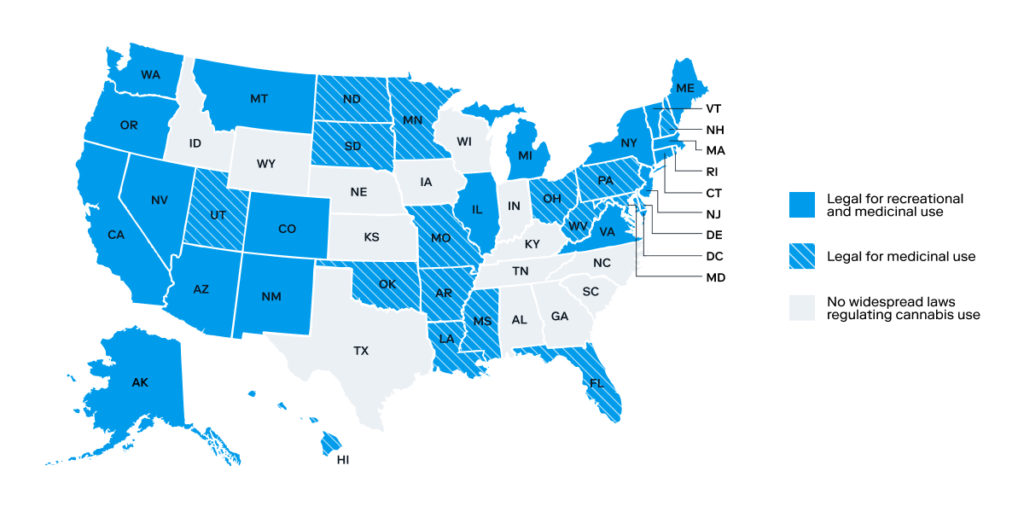May 3, 2022
How the Legal Marijuana Industry Could Change in 2022
Increasingly states are legalizing the plant. Congress is still battling over federal decriminalization.

The beginning of legal cannabis sales in New Jersey is giving fresh meaning to the “garden state.”
New Jersey was one of four states that legalized marijuana for recreational use during the 2020 election via ballot measures. And on April 21, 2022, the first cannabis dispensaries in the state opened. At those locations, consumers can purchase up to one ounce of marijuana, up to five grams of oils, resins, or concentrates, or up to 100 milligrams of edible marijuana-infused products.
Increasingly, states are legalizing marijuana for medicinal and recreational purposes. Here’s the latest on cannabis laws across the U.S, and what those laws mean for the legal marijuana industry’s growth.
Where marijuana is legal
In addition to New Jersey, Montana, Arizona, and South Dakota also voted to legalize marijuana for recreational use in the 2020 election. South Dakota’s courts, however, overturned the legislation. Marijuana for medicinal use is still legal in the state.

California was the first state to legalize marijuana for medicinal use in 1996. In 2012, Washington State and Vermont became the first states to legalize the plant for recreational purposes. Today, cannabis is legal for recreational purposes in 18 states and Washington, D.C. Marijuana is legal for medicinal use in 37 states.
Marijuana on the national level
On April 1, 2022, the House of Representatives passed the Marijuana Opportunity Reinvestment and Expungement (MORE) Act. The bill aims to decriminalize the use of marijuana on a federal level, and would also expunge convictions for marijuana possession, while placing a sales tax on the plant. Proceeds from those taxes would reportedly be reinvested in communities most affected by the criminalization of marijuana.
The bill will now go to the Senate, where it must receive 60 votes to pass into law. However, the Senate is divided along partisan lines, meaning it could be difficult to get enough votes to pass the Senate. Despite this standstill, roughly two-thirds of Americans support the legalization of marijuana nationally.
Investing in the legal cannabis industry
The legal cannabis industry includes companies that grow, package, and distribute marijuana and hemp, as well as cannabinoids such as THC, which is psychoactive, and CBD, which is not. The cannabis and hemp industries also include businesses that make chocolates, gummies, and oils containing cannabinoids.
Additionally, businesses that support or make the materials used by cannabis businesses are part of this industry. These include agriculture machinery, packaging, dispensaries, and professional services companies, among others. Kush Bottles, for example, makes storage containers where people can keep legal cannabis.
Although marijuana isn’t technically legal on a federal level in the U.S., you can still invest in cannabis. Some cannabis companies are listed on exchanges in the U.S. but operate out of places like Canada, where cannabis is legal. You can invest in single stocks of companies such as Aurora Cannabis, Canopy Growth, Cronos Group, and Tilray as single stocks on Stash. Corporate Cannabis, an ETF available on Stash, includes shares of Canopy, Tilray, and more.*
Remember that a diversified portfolio should include investments in bonds, stocks, and exchange-traded funds across different sectors of the economy. Diversification can help you spread out the risk in your portfolio.
Find out more about the legal cannabis industry here.











